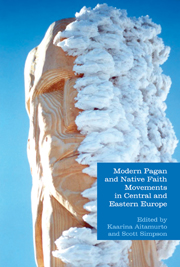Book contents
- Frontmatter
- Contents
- Contributors
- 1 Introduction: Modern Pagan and Native Faith Movements in Central and Eastern Europe
- Part I Overviews
- Part I Country Studies
- 6 Contemporary Paganism in Lithuanian Context: Principal Beliefs and Practices of Romuva
- 7 The Dievturi Movement in Latvia as Invention of Tradition
- 8 Polish Rodzimowierstwo: Strategies for (Re)constructing a Movement
- 9 Ukrainian Paganism and Syncretism: “This Is Indeed Ours!”
- 10 Russian Rodnoverie: Six Portraits of a Movement
- 11 Czech Neopagan Movements and Leaders
- 12 Neopaganism in Slovenia
- 13 Bulgarian Society and the Diversity of Pagan and Neopagan Themes
- 14 Romanian Ethno-Paganism: Discourses of Nationalistic Religion in Virtual Space
- 15 Neopaganism in Hungary: Under the Spell of Roots
- 16 Neopaganism in the Mari El Republic
- 17 A Neopagan Movement in Armenia: The Children of Ara
- Part III Thematic Studies
- Bibliography
- Index
11 - Czech Neopagan Movements and Leaders
from Part I - Country Studies
- Frontmatter
- Contents
- Contributors
- 1 Introduction: Modern Pagan and Native Faith Movements in Central and Eastern Europe
- Part I Overviews
- Part I Country Studies
- 6 Contemporary Paganism in Lithuanian Context: Principal Beliefs and Practices of Romuva
- 7 The Dievturi Movement in Latvia as Invention of Tradition
- 8 Polish Rodzimowierstwo: Strategies for (Re)constructing a Movement
- 9 Ukrainian Paganism and Syncretism: “This Is Indeed Ours!”
- 10 Russian Rodnoverie: Six Portraits of a Movement
- 11 Czech Neopagan Movements and Leaders
- 12 Neopaganism in Slovenia
- 13 Bulgarian Society and the Diversity of Pagan and Neopagan Themes
- 14 Romanian Ethno-Paganism: Discourses of Nationalistic Religion in Virtual Space
- 15 Neopaganism in Hungary: Under the Spell of Roots
- 16 Neopaganism in the Mari El Republic
- 17 A Neopagan Movement in Armenia: The Children of Ara
- Part III Thematic Studies
- Bibliography
- Index
Summary
PERSPECTIVE AND BACKGROUND
Given that the background of the scholar significantly influences her inter interpretation, it is ethical to reveal this to the reader and to reflect how the position of the scholar guides her analysis. Therefore, I begin my discussion with a short outline of my professional path to the study of Neopaganism, but also as a Neopagan leader myself.
I followed my father's footsteps into the Institute of Philosophy and Religious Studies at the Charles University in Prague. Though the institute was mainly oriented toward historical topics, I was more interested in Neopaganism, New Age, and contemporary alternative movements, and specialized in the study of these phenomena. At that stage, my research was indeed quite independent or even isolated. Nevertheless, I managed to accomplish a thesis on health and healing in Neopaganism (2008), and some popular and academic writings about these topics. A turning point in my study was a Reuropa conference in Szeged in 2008, where I met other scholars studying similar topics in other countries. I also got an invitation to speak in Krakow at a conference dedicated to Neopaganism in Poland. For me, these two events opened a new field of possible methodologies. I was particularly impressed by some anthropological studies and started to employ a more anthropological approach, discarding the sociological framework I had applied earlier. At the same time, I postponed the processing of the questionnaire data I have collected for years and began to gather other kinds of material, such as oral histories.
- Type
- Chapter
- Information
- Publisher: Acumen PublishingPrint publication year: 2013



